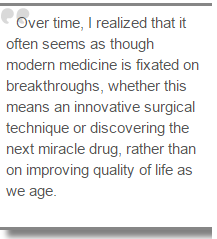Editor's Note: With back-to-school season in full swing, we are pleased to share this post from Kevin Cordeiro, one of our summer interns who aspires to be a physician and has just returned to Boston University.
During my sophomore year of high school, my grandparents moved in with my family. Lucky for me, my grandfather was an avid fantasy football player so it was great having someone to confer with on fantasy team decisions.
Admittedly, I think he was a bit more dedicated to my own fantasy team than I was. While I would be at school, he would spend hours researching team and player stats, as he was in a few fantasy leagues of his own. If I ever had trouble making any decisions on my fantasy team, he would be quick to provide suggestions.
One tragic October night after I went to bed following the Monday Night Football game, my grandfather collapsed in our living room. He was rushed to the hospital and placed on life support. The days following his heart attack were hectic. Life support discussions between family members raged on for days, and to add to the nightmare, Hurricane Sandy was moving in.
My family eventually came to the difficult decision of stopping life support, based on how much everyone knew that my grandfather cherished living an active lifestyle. He was an avid gardener and enjoyed morning and evening walks. The chances the doctors could return that kind of lifestyle to him were slim to none.
Over the course of that emotionally draining time, I wondered why in the years before we were placed in this wrenching situation, nobody—not a doctor, not my mother, not my aunts or uncles—chose to have some sort of “what if?” conversation with my grandfather concerning the kind of care he wanted at the end of life. In that critical time of stress and anxiety, knowing my grandfather’s wishes would have surely provided an ounce of peace and reassurance to the rest of my family.
Ever since I was a little boy, I thought doctors and nurses were miracle workers. They saved lives for a living, and that’s something I wanted to do. Since then, I’ve shadowed a surgical oncologist, two radiologists, and have had my own surgical research project. I was captivated by the glitz and glamour of surgery. I marveled at the problem-solving abilities of surgical teams and admired the knowledge and skills of surgeons. This was what I thought medicine was all about.
That all changed after my time at The John A. Hartford Foundation. The dedicated and motivating staff at the Foundation opened my eyes to an underserved and underfunded area of medicine: geriatrics. Prior to my internship, I had never really thought about aging. As a volunteer EMT, I had treated many elderly patients, but I knew little about geriatrics outside the realms of emergency medicine.
Over time, I realized that it often seems as though modern medicine is fixated on breakthroughs, whether this means an innovative surgical technique or discovering the next miracle drug, rather than on improving quality of life as we age. It made me wonder: What good does increasing the life expectancy to 80 do if, after 65 I’m stuck in my home all day, not able to do the things I enjoy? The answer was simple. Quite frankly, it doesn’t do much good at all.
Dr. Atul Gawande, in his New York Times best seller Being Mortal, asks some very compelling questions on the topics of aging and serious illness. He talks about having end-of-life conversations with family members to address the “what if” scenarios. The very same conversation my grandfather should have had before he passed away.
Dr. Gawande also discusses the notion of “Doctor knows best” and how we need to move away from this patronizing way of thinking. Even speaking for myself, the very aspect of surgery that appealed to me was the “problem-solving” nature the field presented. But far too often, surgeons appear to be absorbed on solving a problem or treating a complication when they should be caring for the patient.
Instead of barraging patients with options on how to manage their illnesses, we should begin to ask what is it that they want, whether this means being able to tend to a vegetable garden and spend hours on ESPN’s website like my grandfather or enjoying the simple pleasure of consuming an ice cream cone. I’ve learned that this is at the core of what “person-centered care” means.
The staff at The John A. Hartford Foundation has made great headway on the issues of serious illness and end-of-life care. With their recent $3.5 million grant to bring together a “dream team” of innovators in the field—including Dr. Gawande’s team—the Foundation hopes to accelerate progress in end-of-life care and bridge the gap between the care patients are receiving and the care they deserve.
As my time at The John A. Hartford Foundation comes to a close, I am left with a sense of urgency. Revolutionizing geriatrics is a collaborative effort, and it will only succeed if today’s aspiring clinicians embrace our duty to provide equal care for all.

